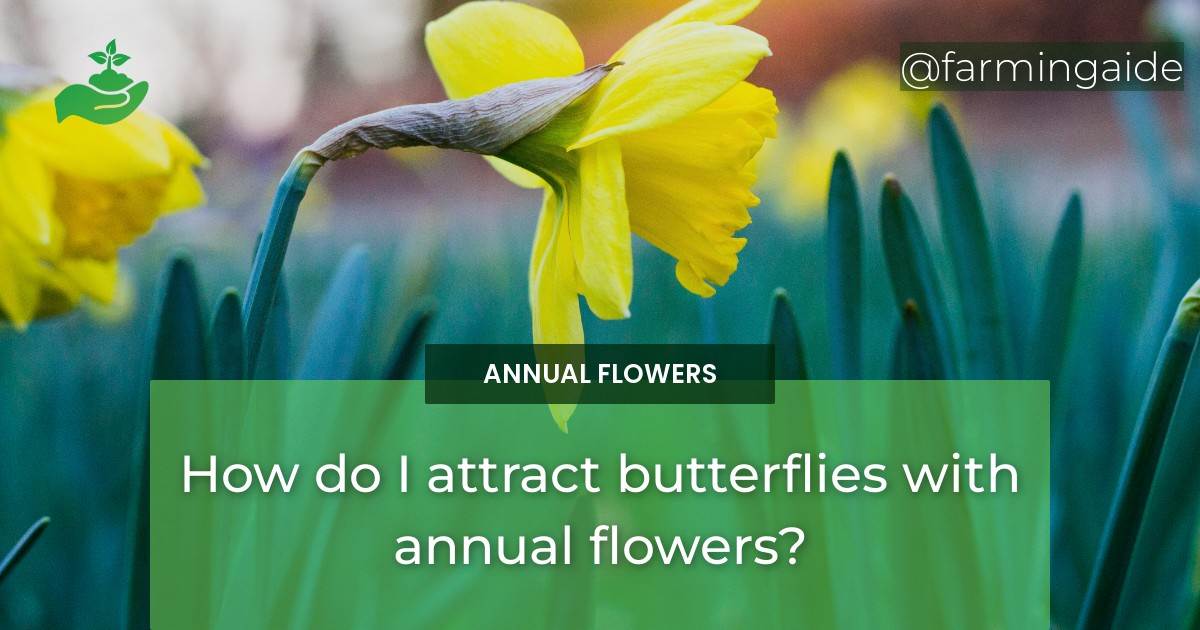Butterflies are beautiful creatures that bring life, color, and motion to any garden. Having annual flowers that attract butterflies is an easy way to add to your garden’s beauty while also benefiting the environment. By planting the right annual flowers, you can attract butterflies to your garden, providing them with food and shelter. This article will guide you on the best annual flowers to attract butterflies and provide tips on how to create a butterfly-friendly garden habitat.
Best Annual Flowers to Attract Butterflies
Zinnia
Zinnias are colorful annual flowers that bloom throughout the summer, attracting butterflies and bees with their bright colors and nectar-rich flowers. They come in a wide variety of colors, including red, orange, yellow, pink, white, and purple.
- Zinnias prefer full sun and well-drained soil.
- They are easy to grow from seed and can be planted in the spring after the last frost.
- Deadheading spent blooms can encourage more flowers to bloom.
Marigold
Marigolds are a popular choice among gardeners for their bright colors and ability to repel pests. They are also a great choice for attracting butterflies to your garden.
- Marigolds prefer full sun and well-drained soil.
- They are easy to grow from seed and can be planted in the spring after the last frost.
- Deadheading spent blooms can encourage more flowers to bloom.
Cosmos
Cosmos are another great choice for attracting butterflies to your garden. They have daisy-like flowers that come in a variety of colors, including pink, white, and red.
- Cosmos prefer full sun and well-drained soil.
- They are easy to grow from seed and can be planted in the spring after the last frost.
- Deadheading spent blooms can encourage more flowers to bloom.
Lantana
Lantana is a low-maintenance annual flower that attracts butterflies with its brightly colored flowers. They come in a variety of colors, including orange, pink, and yellow.
- Lantana prefers full sun and well-drained soil.
- They require little water and are drought-tolerant.
- Deadheading spent blooms can encourage more flowers to bloom.
Nasturtium
Nasturtiums are easy-to-grow annual flowers that come in a range of bright colors, including red, orange, and yellow. They are also edible, with a peppery taste that is great on salads.
- Nasturtiums prefer well-drained soil and partial shade.
- They are easy to grow from seed and can be planted in the spring after the last frost.
- Deadheading spent blooms can encourage more flowers to bloom.
Pentas
Pentas are a favorite of butterflies because of their nectar-rich flowers. They come in shades of pink, red, and white, and bloom throughout the summer.
- Pentas prefer full sun and well-drained soil.
- They require regular watering and can tolerate some shade.
- Deadheading spent blooms can encourage more flowers to bloom.
Salvia
Salvias are a popular choice for attracting butterflies to the garden because of their brightly colored flowers and their ability to bloom throughout the summer and fall.
- Salvias prefer full sun and well-drained soil.
- They require regular watering and can be pruned to encourage more blooms.
- Deadheading spent blooms can encourage more flowers to bloom.
Tips for Creating a Butterfly-Friendly Garden Habitat
Provide Host Plants
Host plants are essential for butterflies to lay their eggs and for caterpillars to feed on. Some great host plants include milkweed, parsley, and fennel.
Create Sunning Spots
Butterflies need to warm up in the sun to be able to fly. Creating sunning spots with rocks or boulders will provide them with the warmth they need.
Provide Shelter
Butterflies need shelter to protect them from the wind and rain. Planting shrubs and trees can provide them with the shelter they need.
Avoid Pesticides
Avoid using pesticides in your garden as they can harm butterflies and other beneficial insects.
Provide Water Source
Butterflies need water to drink, and a shallow dish or birdbath can provide them with the water they need.
Group Plants
Grouping plants together can create a microclimate that butterflies will love. By planting the same species of flowers together, you can create a larger target for butterflies to find.
Choose a Variety of Flowers
Butterflies are attracted to a variety of flowers, so aim for a diverse garden with different colors, shapes, and sizes of flowers.
Other Ways to Attract Butterflies with Annual Flowers
Use Bright Colors
Butterflies are attracted to bright colors, so choose flowers in shades of red, orange, and yellow.
Plant in Masses
Planting flowers in masses can create a larger target for butterflies to find.
Provide a Windbreak
Butterflies are delicate creatures and can be blown away by strong winds. Providing a windbreak with fences or shrubs can protect them from the wind.
Deadhead Regularly
Deadheading spent blooms can encourage more flowers to bloom, providing more nectar for butterflies to feed on.
Grow Flowers in Containers
Growing flowers in containers can allow you to move them around to create microclimates that butterflies will love.
What Types of Annual Flowers Will Attract Butterflies to My Garden?
When planning a butterfly garden, consider planting annual flowers for butterfly garden such as marigolds, zinnias, and cosmos. These vibrant blooms provide nectar for butterflies and add color to your garden. Make sure to include a variety of flower shapes and colors to attract different butterfly species.
Conclusion
Attracting butterflies to your garden with annual flowers is an easy and rewarding activity. By planting the right flowers, providing shelter and food, and avoiding pesticides, you can create a butterfly-friendly garden that will provide joy and wonder for years to come.


